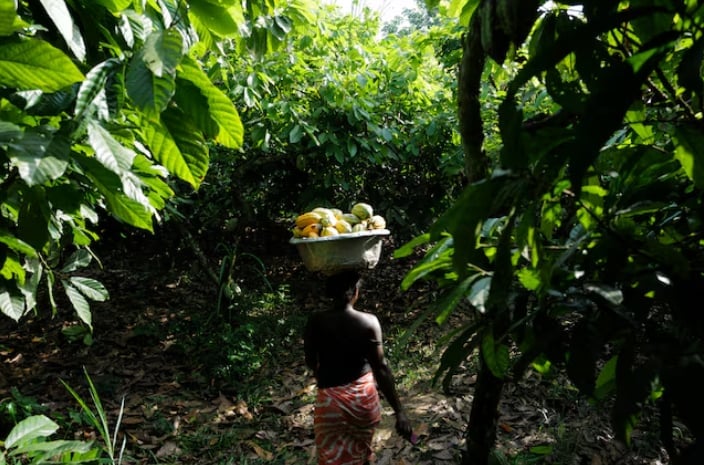October 24, 2025 | 13:03 GMT +7
October 24, 2025 | 13:03 GMT +7
Hotline: 0913.378.918
October 24, 2025 | 13:03 GMT +7
Hotline: 0913.378.918

A labourer carries harvested cocoa pods at a farm in Assin Foso, Ghana November 21, 2024. REUTERS/Francis Kokoroko/File Photo Purchase Licensing Rights.
More than 300,000 farmers expressed anger over what they consider inadequate compensation, with some saying they would smuggle their entire harvest to Ivory Coast if they lived near the border, where prices are perceived to be more favorable.
Ghana on August 4 announced a fixed farmgate price of 51,660 cedis ($4,783) per ton for the 2025/2026 season, or 3,228 cedis per 64 kg bag, a modest 4% increase from the previous season.
Theophilus Tamakloe, vice president of the Ghana Cooperative Cocoa Farmers and Marketing Association, said the price falls short of the government's promise to pay 70% of the free-on-board price used in international trade, which should have yielded around 3,800 cedis per bag.
Kwame Alex, named Best Cocoa Farmer at the recent national awards, said there was a price differential of around 700 cedis between the Ghanaian price and the price fetched by Ivorian cocoa. "(That) creates incentives for smuggling," said Alex, who is not part of the coalition.
"If I'm close to the Cote d'Ivoire border, probably all my cocoa beans will go to Cote d'Ivoire because the government has not been fair to us," Tamakloe said.
The farmers' threat to exclude officers working for Ghana's cocoa regulator, COCOBOD, from their farms represents an escalation that could disrupt agricultural support services across cocoa-growing regions.
Extension officers visit farms regularly to check crops and educate farmers.
The standoff highlights growing frustrations in Ghana's cocoa sector, where smuggling has already become a significant problem. The country lost approximately 160,000 tons of cocoa to illegal cross-border trade in the 2023/24 season, according to COCOBOD officials.
Kwame Alex said pricing was particularly inadequate given rising production costs, including insecticides now selling for 150 cedis each and equipment rental fees reaching 100 cedis per day.
(Reuters)

(VAN) Show cause orders will be issued to retailers who sell imported rice at prices exceeding the maximum suggested retail price (MSRP) of P43 per kilo, Philippines Agriculture Secretary said in a statement on Thursday.

(VAN) Coffee prices on October 20, 2025, remained stable domestically, trading at 113,500–114,500 VND/kg. Similarly, global coffee prices also moved sideways.

(VAN) By October, Vietnam’s coffee exports had surpassed USD 7 billion for the first time and will exceed USD 8 billion within this year.

(VAN) Illinois rancher says Texas, Oklahoma, Kansas lost grass and forage, forcing massive cattle liquidation.

(VAN) Coffee prices on October 12, 2025, remained flat, trading at VND 113,000–VND 114,000/kg. This week, coffee prices continued to decline sharply.

(VAN) Coffee prices on October 9, 2025, have rebounded. Domestic coffee prices have risen by VND 1,000, trading at VND 114,000–VND 115,000/kg.

(VAN) Coffee prices on October 8, 2025, continue to decline. Domestic coffee prices have dropped by VND 1,000, trading at VND 113,000 - 114,000/kg.